2019英语四级段落翻译练习:中国人的姓名
2019年高中英语作文-中国人的名字 Chinese Names
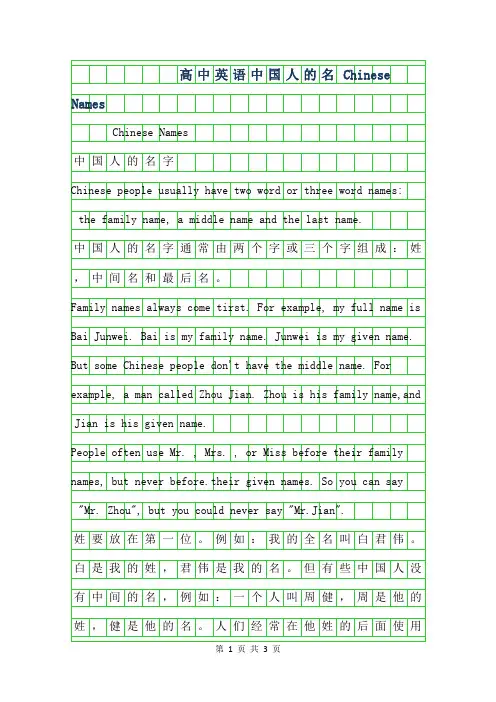
高中英语中国人的名 Chinese Names
Chinesle usually have two word or three word names: the family name, a middle name and the last name.
中国人的名字通常由两个字或三个字组成:姓,中间名和最后名。
姓要放在第一位。例如:我的全名叫白君伟。白是我的姓,君伟是我的名。但有些中国人没有中间的名,例如:一个人叫周健,周是他的姓,健是他的名。人们经常在他姓的后面使用先生、夫人、小姐,但此种说法从不在名字后面使用。所以你能说“周先生”,而不能说“健先生”。
Chinese names are different from English names. In England, the last name is the family name. The first and the middle name is tile given name. For example,there is a man called Jim Henry Brown. Brown is his family name. Jim Henry is his given name. Another difference between~ E.nglish and Chinese names is that in China, the younger people's names shouldn't be the same as the elder's in the family.For example, my grandpa's name is Guo Dong, so i can't be called Guo Dong again.This shows that we respect the old people.
中国姓氏英译(汉英对照版)
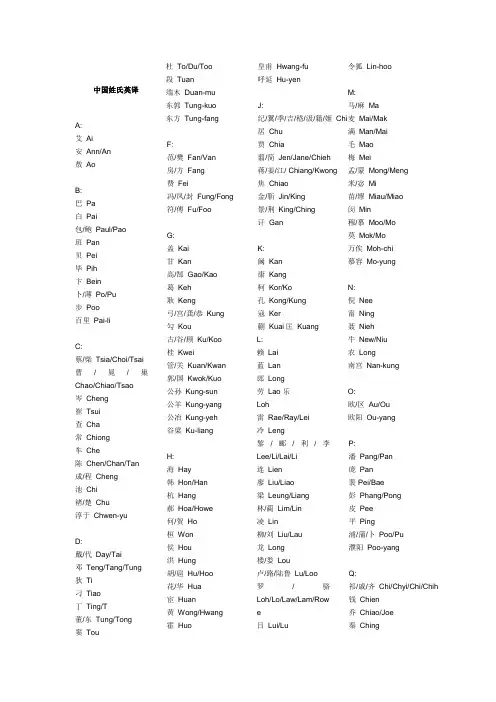
中国姓氏英译A:艾Ai安Ann/An敖AoB:巴Pa白Pai包/鲍Paul/Pao班Pan贝Pei毕Pih卞Bein卜/薄Po/Pu步Poo百里Pai-liC:蔡/柴Tsia/Choi/Tsai 曹/晁/巢Chao/Chiao/Tsao岑Cheng崔Tsui查Cha常Chiong车Che陈Chen/Chan/Tan 成/程Cheng池Chi褚/楚Chu淳于Chwen-yuD:戴/代Day/Tai邓Teng/Tang/Tung 狄Ti刁Tiao丁Ting/T董/东Tung/Tong窦Tou 杜To/Du/Too段Tuan端木Duan-mu东郭Tung-kuo东方Tung-fangF:范/樊Fan/Van房/方Fang费Fei冯/凤/封Fung/Fong符/傅Fu/FooG:盖Kai甘Kan高/郜Gao/Kao葛Keh耿Keng弓/宫/龚/恭Kung勾Kou古/谷/顾Ku/Koo桂Kwei管/关Kuan/Kwan郭/国Kwok/Kuo公孙Kung-sun公羊Kung-yang公冶Kung-yeh谷梁Ku-liangH:海Hay韩Hon/Han杭Hang郝Hoa/Howe何/贺Ho桓Won侯Hou洪Hung胡/扈Hu/Hoo花/华Hua宦Huan黄Wong/Hwang霍Huo皇甫Hwang-fu呼延Hu-yenJ:纪/翼/季/吉/嵇/汲/籍/姬Chi居Chu贾Chia翦/简Jen/Jane/Chieh蒋/姜/江/ Chiang/Kwong焦Chiao金/靳Jin/King景/荆King/Ching讦GanK:阚Kan康Kang柯Kor/Ko孔Kong/Kung寇Ker蒯Kuai匡KuangL:赖Lai蓝Lan郎Long劳Lao乐Loh雷Rae/Ray/Lei冷Leng黎/郦/利/李Lee/Li/Lai/Li连Lien廖Liu/Liao梁Leung/Liang林/蔺Lim/Lin凌Lin柳/刘Liu/Lau龙Long楼/娄Lou卢/路/陆鲁Lu/Loo罗/骆Loh/Lo/Law/Lam/Rowe吕Lui/Lu令狐Lin-hooM:马/麻Ma麦Mai/Mak满Man/Mai毛Mao梅Mei孟/蒙Mong/Meng米/宓Mi苗/缪Miau/Miao闵Min穆/慕Moo/Mo莫Mok/Mo万俟Moh-chi慕容Mo-yungN:倪Nee甯Ning聂Nieh牛New/Niu农Long南宫Nan-kungO:欧/区Au/Ou欧阳Ou-yangP:潘Pang/Pan庞Pan裴Pei/Bae彭Phang/Pong皮Pee平Ping浦/蒲/卜Poo/Pu濮阳Poo-yangQ:祁/戚/齐Chi/Chyi/Chi/Chih钱Chien乔Chiao/Joe秦Ching裘/仇/邱Chiu屈/曲/瞿Chiu/ChuR:冉Yien饶Yau任Jen/Yum容/荣Yung阮Yuen芮NeiS:司Sze桑Sang沙Sa邵Shao单/山San尚/商Sang/Shang沈/申Shen盛Shen史/施/师/石Shih/Shi苏/宿/舒Sue/Se/Soo/Hsu 孙Sun/Suen宋Song/Soung司空Sze-kung司马Sze-ma司徒Sze-to单于San-yu上官Sang-kuan申屠Shen-tuT:谈Tan汤/唐Town/Towne/Tang 邰Tai谭Tan/Tam陶Tao藤Teng田Tien童Tung屠Tu澹台Tan-tai拓拔Toh-bah W:万Wan王/汪Wong魏/卫/韦Wei温/文/闻Wen/Chin/V ane/Man翁Ong吴/伍/巫/武/邬/乌Wu/NG/WooX:奚/席Hsi/Chi夏Har/Hsia/(Summer)肖/萧Shaw/Siu/Hsiao项/向Hsiang解/谢Tse/Shieh辛Hsing刑Hsing熊Hsiung/Hsiun许/徐/荀Shun/Hui/Hsu宣Hsuan薛Hsueh西门See-men夏侯Hsia-hou轩辕Hsuan-yuenY:燕/晏/阎/严/颜Yim/Y en杨/羊/养Y oung/Y ang姚Y ao/Y au叶Yip/Y eh/Yih伊/易/羿Yih/E殷/阴/尹Yi/Yin/Ying应Ying尤/游Y u/Y ou俞/庾/于/余/虞/郁/余/禹Y ue/Y u袁/元Y uan/Y uen岳Y ue云Wing尉迟Y u-chi宇文Y u-wenZ:藏Chang曾/郑Tsang/Cheng/T seng訾Zi宗Chung左/卓Cho/Tso翟Chia詹Chan甄Chen湛T san张/章Cheung/Chang赵/肇/招Chao/Chiu/Chiao/Chioa周/邹Chau/Chou/Chow钟Chung祖/竺/朱/诸/祝Chu/Chuh庄Chong钟离Chung-li诸葛Chu-keh中国传统小吃的英文表达中式早点:烧饼Clayoven rolls油条Friedbread stick韭菜盒Friedleek dumplings水饺Boileddumplings蒸饺Steameddumplings馒头Steamed buns割包Steamedsandwich饭团Riceand vegetableroll蛋饼Eggcakes皮蛋100-year egg咸鸭蛋Salted duck egg豆浆Soybean milk饭类:稀饭Riceporridge白饭Plainwhite rice油饭Glutinous oilrice糯米饭Glutinous rice卤肉饭Braised porkrice蛋炒饭Friedrice with egg地瓜粥Sweetpotato congee面类:馄饨面Wonton & noodles刀削面Sliced noodles麻辣面Spicyhot noodles麻酱面Sesame pastenoodles鴨肉面Duckwith noodles鱔魚面Eelnoodles榨菜肉丝面Pork , pickled mustard green noodles牡蛎细面Oyster thin noodles板条Flat noodles米粉Rice noodles炒米粉Fried rice noodles冬粉Green bean noodle汤类:鱼丸汤Fish ball soup貢丸汤Meat ball soup蛋花汤Egg & vegetable soup蛤蜊汤Clams soup牡蛎汤Oyster soup紫菜汤Seaweed soup酸辣汤Sweet & sour soup馄饨汤Wonton soup 、猪肠汤Pork intestine soup肉羹汤Pork thick soup鱿鱼汤Squid soup花枝羹Squid thick soup甜点:爱玉Vegetariangelatin糖葫芦Tomatoes onsticks长寿桃LongevityPeaches芝麻球Glutinous ricesesame balls麻花Hempflowers双胞胎Horsehooves冰类:绵绵冰Meinmein ice麦角冰Oatmeal ice地瓜冰Sweetpotato ice紅豆牛奶冰Red bean withmilk ice八宝冰Eighttreasures ice豆花Tofupudding果汁:甘蔗汁Sugarcane juice酸梅汁Plumjuice杨桃汁Starfruit juice青草茶Herbjuice点心牡蛎煎Oyster omelet臭豆腐Stinky tofu(Smelly tofu)油豆腐Oilybean curd麻辣豆腐Spicy hot beancurd虾片Prawncracker虾球Shrimp balls春卷Spring rolls蛋卷Chicken rolls碗糕Saltyrice pudding筒仔米糕Rice tubepudding红豆糕Redbean cake绿豆糕Beanpaste cake糯米糕Glutinous ricecakes萝卜糕Friedwhite radishpatty芋头糕Tarocake肉圆TaiwaneseMeatballs水晶饺Pyramiddumplings肉丸Rice-meatdumplings豆干Driedtofu其他:当归鸭Angelica duck槟榔Betelnut火锅Hotpot。
初中英语作文中常出现的中国人名
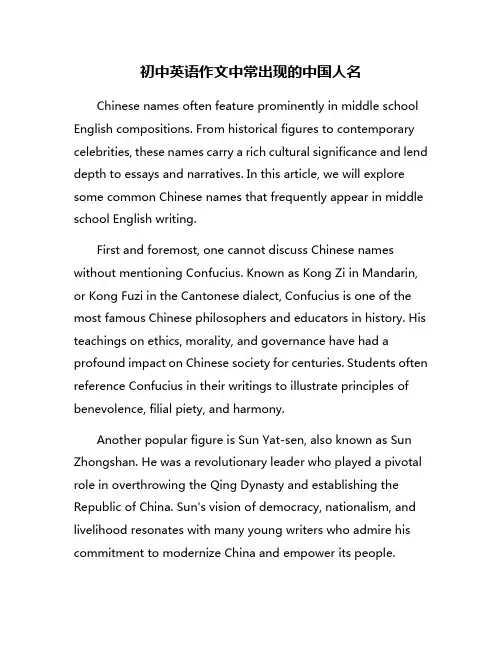
初中英语作文中常出现的中国人名Chinese names often feature prominently in middle school English compositions. From historical figures to contemporary celebrities, these names carry a rich cultural significance and lend depth to essays and narratives. In this article, we will explore some common Chinese names that frequently appear in middle school English writing.First and foremost, one cannot discuss Chinese names without mentioning Confucius. Known as Kong Zi in Mandarin, or Kong Fuzi in the Cantonese dialect, Confucius is one of the most famous Chinese philosophers and educators in history. His teachings on ethics, morality, and governance have had a profound impact on Chinese society for centuries. Students often reference Confucius in their writings to illustrate principles of benevolence, filial piety, and harmony.Another popular figure is Sun Yat-sen, also known as Sun Zhongshan. He was a revolutionary leader who played a pivotal role in overthrowing the Qing Dynasty and establishing the Republic of China. Sun's vision of democracy, nationalism, and livelihood resonates with many young writers who admire his commitment to modernize China and empower its people.In addition to historical figures, modern-day celebrities are also common subjects in middle school English compositions. Jackie Chan, a renowned actor and martial artist, is frequently mentioned for his impressive stunts and charisma on screen. His international fame and cultural impact make him a compelling figure for students to write about.Moreover, Yao Ming, the legendary basketball player, is another popular name that often appears in students' essays. Standing at over seven feet tall, Yao Ming dominated the court with his skills and sportsmanship, inspiring many young fans to pursue their athletic dreams.Lastly, when it comes to female Chinese names, Mulan is a beloved character from Chinese folklore who embodies courage, resilience, and loyalty. The story of Mulan, a young woman who disguised herself as a man to take her father's place in the army, is a timeless tale of bravery and sacrifice that resonates with readers of all ages.In conclusion, Chinese names play a significant role in middle school English compositions, adding depth, cultural context, and diversity to students' writing. Whether historical figures like Confucius and Sun Yat-sen or modern-day celebrities like Jackie Chan and Yao Ming, these names offer a window intoChinese culture and history that enriches the learning experience for young writers. By exploring and incorporating these names into their essays, students can enhance their understanding of China and its people while honing their writing skills in English.。
Chinese Names(中国人的名字),Chinese Names(中国人的名字)范文-作文
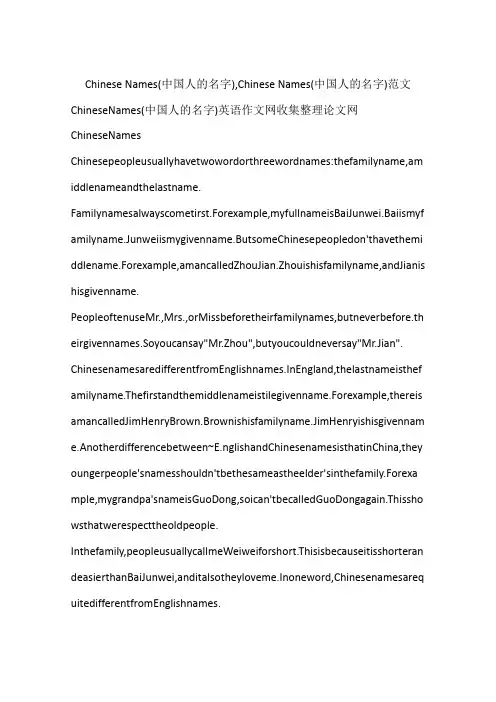
Chinese Names(中国人的名字),Chinese Names(中国人的名字)范文ChineseNames(中国人的名字)英语作文网收集整理论文网ChineseNames Chinesepeopleusuallyhavetwowordorthreewordnames:thefamilyname,am iddlenameandthelastname.Familynamesalwayscometirst.Forexample,myfullnameisBaiJunwei.Baiismyf amilyname.Junweiismygivenname.ButsomeChinesepeopledon'thavethemi ddlename.Forexample,amancalledZhouJian.Zhouishisfamilyname,andJianis hisgivenname.PeopleoftenuseMr.,Mrs.,orMissbeforetheirfamilynames,butneverbefore.th eirgivennames.Soyoucansay"Mr.Zhou",butyoucouldneversay"Mr.Jian". ChinesenamesaredifferentfromEnglishnames.InEngland,thelastnameisthef amilyname.Thefirstandthemiddlenameistilegivenname.Forexample,thereis amancalledJimHenryBrown.Brownishisfamilyname.JimHenryishisgivennam e.Anotherdifferencebetween~E.nglishandChinesenamesisthatinChina,they oungerpeople'snamesshouldn'tbethesameastheelder'sinthefamily.Forexa mple,mygrandpa'snameisGuoDong,soican'tbecalledGuoDongagain.Thissho wsthatwerespecttheoldpeople.Inthefamily,peopleusuallycallmeWeiweiforshort.Thisisbecauseitisshorteran deasierthanBaiJunwei,anditalsotheyloveme.Inoneword,Chinesenamesareq uitedifferentfromEnglishnames.中国人的名字中国人的名字通常由两个字或三个字组成:姓,中间名和最后名。
历年大学英语四级翻译真题汇总(含参考范文)
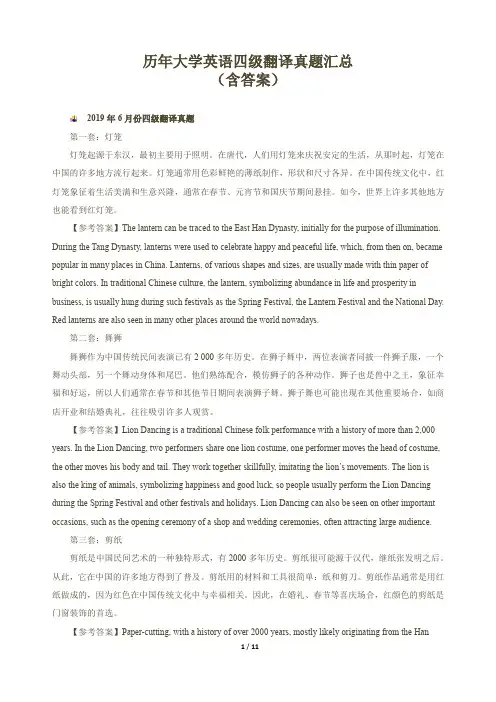
历年大学英语四级翻译真题汇总(含答案)2019年6月份四级翻译真题第一套:灯笼灯笼起源于东汉,最初主要用于照明。
在唐代,人们用灯笼来庆祝安定的生活,从那时起,灯笼在中国的许多地方流行起来。
灯笼通常用色彩鲜艳的薄纸制作,形状和尺寸各异。
在中国传统文化中,红灯笼象征着生活美满和生意兴隆,通常在春节、元宵节和国庆节期间悬挂。
如今,世界上许多其他地方也能看到红灯笼。
【参考答案】The lantern can be traced to the East Han Dynasty, initially for the purpose of illumination. During the Tang Dynasty, lanterns were used to celebrate happy and peaceful life, which, from then on, became popular in many places in China. Lanterns, of various shapes and sizes, are usually made with thin paper of bright colors. In traditional Chinese culture, the lantern, symbolizing abundance in life and prosperity in business, is usually hung during such festivals as the Spring Festival, the Lantern Festival and the National Day. Red lanterns are also seen in many other places around the world nowadays.第二套:舞狮舞狮作为中国传统民间表演已有2 000多年历史。
2019年12月四级翻译及其答案
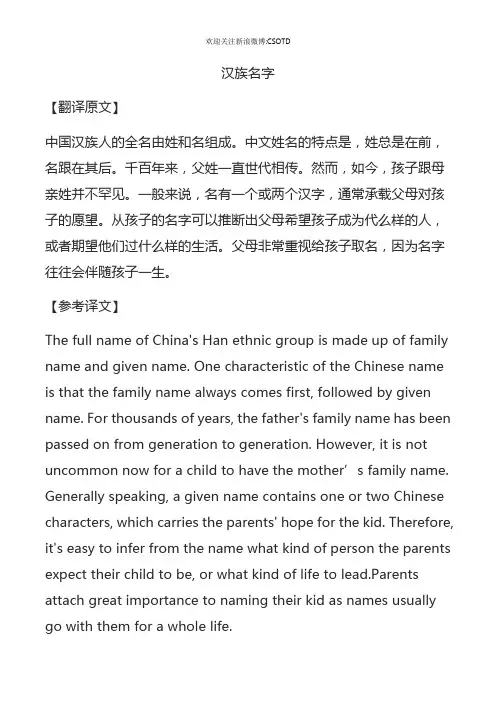
汉族名字【翻译原文】中国汉族人的全名由姓和名组成。
中文姓名的特点是,姓总是在前,名跟在其后。
千百年来,父姓一直世代相传。
然而,如今,孩子跟母亲姓并不罕见。
一般来说,名有一个或两个汉字,通常承载父母对孩子的愿望。
从孩子的名字可以推断出父母希望孩子成为代么样的人,或者期望他们过什么样的生活。
父母非常重视给孩子取名,因为名字往往会伴随孩子一生。
【参考译文】The full name of China's Han ethnic group is made up of family name and given name. One characteristic of the Chinese name is that the family name always comes first, followed by given name. For thousands of years, the father's family name has been passed on from generation to generation. However, it is not uncommon now for a child to have the mother’s family name. Generally speaking, a given name contains one or two Chinese characters, which carries the parents' hope for the kid. Therefore, it's easy to infer from the name what kind of person the parents expect their child to be, or what kind of life to lead.Parents attach great importance to naming their kid as names usually go with them for a whole life.家庭观念中国的家庭观念与其文化传统有关。
中国人的名字英语作文
中国人的名字英语作文Chinese Names。
Chinese names have a rich history and cultural significance. They are an integral part of Chinese identity and reflect the values, beliefs, and aspirations of individuals and their families. In this article, we will explore the unique characteristics of Chinese names and their importance in Chinese society.First and foremost, Chinese names are typically composed of two or three characters. The surname, which is passed down from one generation to another, comes first, followed by the given name. Unlike in Western cultures, the surname holds great importance in Chinese names as it signifies the family lineage. It is common for Chinese people to address each other by their surnames, showing respect and acknowledging the family ties.The given name, on the other hand, is chosen carefully by parents and carries a deeper meaning. Chinese parents often consult fortune-tellers, consider the five elements, and analyze the compatibility of characters to select an auspicious name for their child. The given name can reflect the parents' hopes for their child's future, such as success, intelligence, or good health. It is believed that a well-chosen name can bring good fortune and blessings to the individual throughout their life.Furthermore, Chinese names often have poetic and philosophical connotations. Many characters used in Chinese names are derived from nature, such as flowers, birds, or elements like water and fire. These names evoke a sense of beauty, harmony, and balance, reflecting the deep connection between humans and nature in Chinese culture. Additionally, Chinese names may also incorporate characters with positive meanings, such as "love," "happiness," or "prosperity," further emphasizing the aspirations and desires of the individual and their family.Chinese names also demonstrate the importance of hierarchy and respect in Chinese society. Traditionally, it is considered impolite to address someone older or of highersocial status by their given name. Instead, honorific titles or kinship terms are used to show respect. This practice highlights the significance of age and social position in Chinese culture and emphasizes the importance of maintaining harmonious relationships within the community.In recent years, there has been a growing trend of Chinese people adopting English names, especially in international settings. This practice aims to facilitate communication with non-Chinese speakers and simplify the pronunciation of their names. However, Chinese individuals often retain their Chinese names as a symbol of their cultural heritage and personal identity. The use of both Chinese and English names reflects the adaptability and openness of Chinese people to embrace different cultures while preserving their own.In conclusion, Chinese names are not merely labels but carry profound meanings and cultural significance. They reflect the values, aspirations, and connections that individuals have within their families and society. Chinese names are carefully chosen, often incorporating elements of nature and positive attributes. They demonstrate the importance of respect, hierarchy, and harmony in Chinese culture. As Chinese society becomes more globalized, the adoption of English names has become common, but the retention of Chinese names highlights the importance of cultural heritage and personal identity. Chinese names truly embody the rich history and traditions of Chinese civilization.。
高中英语作文-中国人的名字 Chinese Names
高中英语作文中国人的名字 Chinese NamesChinese people usually have two word or three word names: the family name, a middle name and the last name. 中国人的名字通常由两个字或三个字组成:姓,中间名和最后名。
Family names always come tirst. For example, my full name is Bai Junwei. Bai is my family name. Junwei is my given name. But some Chinese people don’t have the middle name. For example, a man called Zhou Jian. Zhou is his family name,and Jian is his given name. People often use Mr. , Mrs. , or Miss before their family names, but never before.their given names. So you can say “Mr. Zhou”, but you could never say “Mr.Jian”. 姓要放在第一位。
例如:我的全名叫白君伟。
白是我的姓,君伟是我的名。
但有些中国人没有中间的名,例如:一个人叫周健,周是他的姓,健是他的名。
人们经常在他姓的后面使用先生、夫人、小姐,但此种说法从不在名字后面使用。
所以你能说“周先生”,而不能说“健先生”。
Chinese names are different from English names. In England, the last name is the family name. The first and the middle name is tile given name. For example,there isa man called Jim Henry Brown. Brown is his family name. Jim Henry is his given name. Another difference between~ E.nglish and Chinese names is that in China, the younger people’s names shouldn’t be the same as the elder’s in the family.For example, my grandpa’s name is Guo Dong, so i can’t be called Guo Dong again.This shows that we respect the old people. 中国人的名字与英国人的名字不同。
2019年12月英语四级考试翻译真题及答案解析三套整
2019年12月英语四级考试翻译真题及答案解析三套整翻译:中国家庭十分重视孩子的教育。
许多父母认为应该努力工作,确保孩子受到良好的教育。
他们不仅非常情愿为孩子的教育投资,而且花很多时间督促他们学习。
多数家长希望孩子能上名牌大学。
由于改革开放,越来越多的家长能送孩子到国外学习或参加国际交流项目,让其拓宽视野。
通过这些努力,他们期待孩子健康成长,为国家的发展和繁荣做出贡献。
【参考范文】Chinese families attach due importance to children's education. Numerous parents deem that they should work hard to ensure that their children are well educated. Not only are they very willing to invest in their children's education, but they also spend a lot of time urging them to learn. The great majority of parents expect that their children are able to go to prestigious universities. As a result of the reform and opening up, an increasing number of parents can send their children to study abroad or participate in international exchange projects, so as to broaden their horizons. Through these efforts, they expect their children to grow up healthily and contribute to the development and prosperity of the country.【解析】:这一篇翻译的主题是中国家庭教育观念,篇章中主要考察状语以及宾语从句的翻译。
2019年12月英语四级翻译答案:起名字
【导语】2019年12⽉英语四级考试已结束,⽆忧考四六级频道在考后特别整理了2019年12⽉英语四级翻译答案之起名字,仅供⼤家参考,祝⼤家顺利通过四级考试! 【翻译原⽂】 中国汉族⼈的全名由姓和名组成。
中⽂姓名的特点是,姓总是在前,名跟在其后。
千百年来,⽗姓⼀直世代相传。
然⽽,如今,孩⼦跟母亲姓并不罕见。
⼀般来说,名有⼀个或两个汉字,通常承载⽗母对孩⼦的愿望。
从孩⼦的名字可以推断出⽗母希望孩⼦成为代么样的⼈,或者期望他们过什么样的⽣活。
⽗母⾮常重视给孩⼦取名,因为名字往往会伴随孩⼦⼀⽣。
【参考译⽂】 The full name of China's Han ethnic group is made up of family name and given name. One characteristic of the Chinese name is that the family name always comes first, followed by given name. For thousands of years, the father's family name has been passed on from generation to generation. However, it is not uncommon now for a child to have the mother’s family name. Generally speaking, a given name contains one or two Chinese characters, which carries the parents' hope for the kid. Therefore, it's easy to infer from the name what kind of person the parents expect their child to be, or what kind of life to lead.Parents attach great importance to naming their kid as names usually go with them for a whole life. 【翻译分析】 1) 全名由....组成:the full name is composed of/ made up of/ consisted of/ formed of 2) ...的特点是:the characteristic of the Chinese name is that... 3) 世代相传:from generation to generation 4) ...不罕见:it is not uncommon now for a child to... 5) ⾮常重视...:attach great importance to doing sth温馨提⽰:2019年12⽉英语四级考试采取“多题多卷”模式,试题顺序不统⼀,请依据试题进⾏核对。
- 1、下载文档前请自行甄别文档内容的完整性,平台不提供额外的编辑、内容补充、找答案等附加服务。
- 2、"仅部分预览"的文档,不可在线预览部分如存在完整性等问题,可反馈申请退款(可完整预览的文档不适用该条件!)。
- 3、如文档侵犯您的权益,请联系客服反馈,我们会尽快为您处理(人工客服工作时间:9:00-18:30)。
2019英语四级段落翻译练习:中国人的姓名
中国人的姓名通常姓(family name)在前,名(givenname)在后。
中国有10多亿个名字,所以人们即便在随意场合也可能会连名带姓地介绍自己,这是很寻常的。
历,人名的受欢迎稈度会随着时事而变化。
例如,*(Cultural Rcvolution)期间,“红”颇受欢迎,因其代表“革命”。
20世纪80年代改革开放时期,“致富”成为一个名字,因其意为“变得富有”。
In China the family name is usually in front of thegiven name. It isn't unusual for a man to introducehimself by his family name with given name even incasual situationsbecause there are more than abillion given names. The Chinese given name has ahistory of changing with popularity depending on what events were going on. For instance,during the Cultural Revolution Hong (the color red) was very popular as it presentsrevolution. During the reform and opening up in the 1980s, Zhifu became one given name asit means “getting rich”.。
